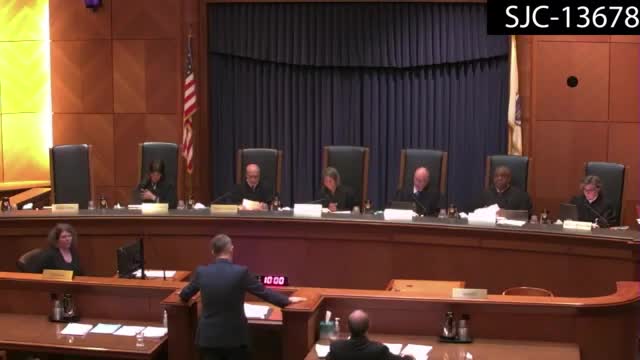Mass. high court hears appeal over short detention of defendant found unlikely to be restored to competency
Get AI-powered insights, summaries, and transcripts
Subscribe
Summary
In oral argument before the Massachusetts Supreme Judicial Court, defense counsel said the defendant—found not competent and unlikely to be restorable—was detained on bail in violation of Abbott A and Jackson v. Indiana principles; the Commonwealth urged dismissal as moot and stressed public-safety concerns and the brief duration of detention.
BOSTON — The Massachusetts Supreme Judicial Court heard arguments in an appeal over whether a superior court judge violated substantive due process by ordering bail that left a defendant who had been found incompetent to stand trial detained despite experts concluding restoration was unlikely.
Defense attorney Ross Schreiber told the court that "the foreseeable future for this defendant on 08/09/2024 was exactly the same as it had been for years" and that "all of the experts ... had come to the realization that this defendant was unlikely to ever be restored to competency." He argued that, under this record and the court's Abbott A and Jackson v. Indiana precedents, "we cannot expect him to attain competency in the foreseeable future" and that detention on bail under those circumstances violates due process.
The defense emphasized evaluative reports in the record, saying three forensic reports (including one by Dr. Muniz in January 2020 and later reports) reached the same ultimate conclusion that the defendant's cognitive deficits were untreatable and not remediable. Schreiber told the justices that the trial judge acknowledged Abbott A and Jackson but nonetheless set bail citing public safety, a decision the defense has appealed.
Commonwealth attorney Kenneth Steinfeld responded that the case is likely moot because the period the defendant was held on the challenged bail orders was short. "He was held for a total of 10 days solely on these bail orders," Steinfeld told the court, arguing that courts "do not decide moot cases" and that a fuller, different record may exist if the issue recurs. He noted additional hearings and reports are scheduled and that if the defendant were held longer the factual record would change.
Steinfeld also urged the court to weigh the Commonwealth's public-safety interest. He described the defendant as someone who has committed serious gun and drug offenses and said that danger to the community is a relevant Abbott A factor when determining whether detention violates substantive due process. He argued that Abbott A's multi-factor analysis—including the possibility of restoration, the length of detention and the defendant's dangerousness—supports the superior court judge's handling of the case on this record.
The bench pressed both sides on factual points, including the timing of the most recent competency evaluations (defense counsel referenced reports from April 2020 and April 2022 and the parties discussed which reports are closest in time to the bail decision) and whether the evaluators' hedged language leaves a reasonable possibility of restoration. Counsel and the justices also debated whether Abbott A—often applied in the civil-commitment (58A) context—should apply identically when detention results from inability to post bail under the criminal-bail statute (referred to in argument as "57").
Steinfeld suggested a procedural safeguard as a supervisory option: periodic competency evaluations or a supervisory order (for example, a 90-day review) to ensure courts and parties remain vigilant about defendants held on bail while competency is in question. The argument concluded with the case submitted for decision.
The court did not announce a ruling from the bench.
